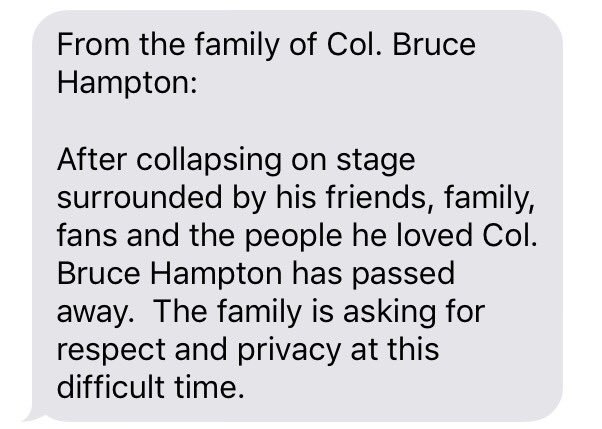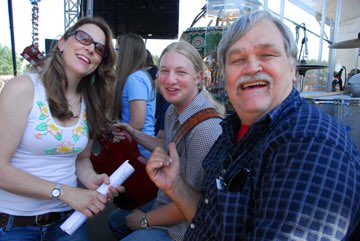
Bruce Hampton, 70, Jam Scene Patriarch, Dies After Collapsing Onstage
inNewson May 3, 2017
Bruce Hampton, who was known as the granddaddy of the jam scene for his energetic, eccentric guitar playing in a career that lasted five decades, died in Atlanta on Monday. He was 70.
His death was confirmed on Tuesday by Investigator Eric Sliz of the Fulton County Medical Examiner’s Office in Atlanta.
Mr. Hampton, who for years called himself “colonel” before officially adding the abbreviated title to his name in 2000, collapsed onstage at the Fox Theater in the waning moments of a concert in honor of his 70th birthday.
The concert, billed as “Hampton 70: A Celebration of Col. Bruce Hampton,” was coming to a close with an encore performance of the song “Turn On Your Love Light” when he collapsed, Blake Budney, manager of the Tedeschi Trucks Band, whose members were in attendance said in a telephone interview.
He was taken to a nearby hospital, where he died, Mr. Budney said.
Mr. Hampton was born on April 30, 1947. He was born in Oak Ridge, Tenn., and grew up in Atlanta, according to a biography posted by Terminus Records, which has released several of his albums.
He first gained attention in the late 1960s and early ’70s as the leader of the avant-garde Hampton Grease Band, which Robert Palmer of The New York Times labeled variously as “one of the more cockeyed rock groups” of the era and “a mischievous, mystifying group.” Critics, Mr. Palmer wrote, called the band’s music “eclectic” — meaning, he said, that it drew from a number of sources and critics could not figure out what else to call it.
The Hampton Grease Band released an album on Columbia — Mr. Hampton liked to claim it was one the worst-selling albums in the label’s history — and opened for the Grateful Dead, the Allman Brothers Band and other nationally known acts. But it was also known for its twisted sense of humor, which included playing practical jokes. The band once opened a concert for a pop-rock group by playing its own versions of that group’s hits, according to a report in The Times. The move elicited boos, and the Hampton Grease Band responded with a lengthy encore.
In the decades that followed, Mr. Hampton would lead, join or help form a number of other acts, including the Aquarium Rescue Unit, the Fiji Mariners and the Code Talkers.
“Bruce Hampton is the 1970s rock star who wasn’t: a comic, bearish, dadaist spieler with a deep Georgia accent, a Dali in the body of a Southern wrestler,” Ben Ratliff of The Times wrote in a review of a Code Talkers performance in 2001.
Others labeled Mr. Hampton’s music “surrealist.” In a video of an interview posted in June, he was asked who he was. In an absurdist answer, he replied with a laugh: “It’s a mix of 103 people. I’m not sure I exist.”
Friends and family said Mr. Hampton was also a mentor to many musicians, with a keen eye for talent. His influence on those musicians and his dedication to aiding their careers were perhaps the most lasting element of his legacy, they said.
Mr. Hampton’s survivors include his wife, Sara, and a brother, Jim.
“He taught me how to be weird,” James Forrest Hampton III, who identified himself as Mr. Hampton’s nephew, wrote in a message posted on Facebook, “and how weird was good.”
Many of Mr. Hampton’s associates also noted the seemingly appropriate end to the musician’s life.
“Bruce was the only person I could think of who has ever played at his own funeral, because in essence, that’s what he did,” Scott McKinney, a bluegrass musician known as Fudd who said that he had known Mr. Hampton more than 20 years, said in a telephone interview. “Bruce couldn’t script it any better.”







